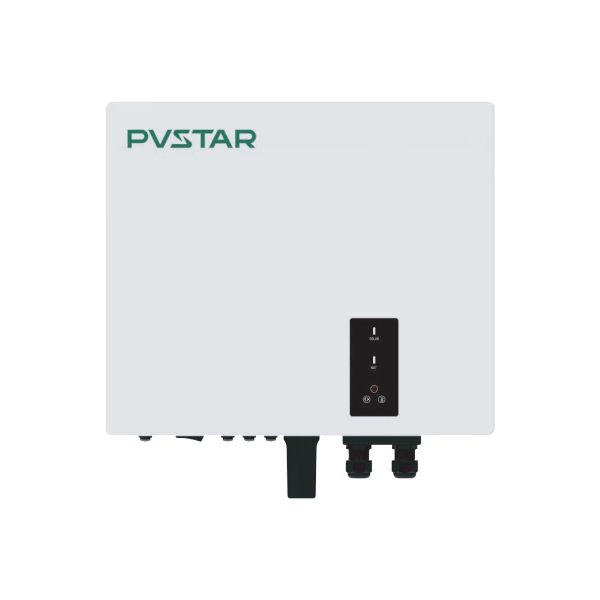Wholesale Commercial Solar Inverter - Three Phase Hybrid 5-12kW
Product Main Parameters
| Model | PVS-A05K-TH2M-EU | PVS-A06K-TH2M-EU | PVS-A08K-TH2M-EU | PVS-A10K-TH2M-EU | PVS-A12K-TH2M-EU |
|---|---|---|---|---|---|
| Recommended Max. PV input power | 7500Wp | 9000Wp | 12000Wp | 15000Wp | 18000Wp |
| Max. PV input voltage | 1100V | 1100V | 1100V | 1100V | 1100V |
| MPPT voltage range/Rated input voltage | 150V~950V/600V | 200V~950V/600V | 200V~950V/600V | 200V~950V/600V | 200V~950V/600V |
| ... (other parameters) | ... | ... | ... | ... | ... |
Common Product Specifications
| Feature | Description |
|---|---|
| Conversion Efficiency | Up to 98.4% |
| AC Output | Three-phase power |
| Safety Features | Surge protection, isolation, emergency shutdown |
| ... (other specifications) | ... |
Product Manufacturing Process
The manufacturing process of commercial solar inverters involves several stages, from design and prototyping to final assembly and testing. According to authoritative sources, the process begins with the design phase, where engineers create detailed schematics and select appropriate materials and components. This is followed by prototyping, where initial models are built and tested for performance and reliability. Once the prototype meets all specifications, the production process begins, involving automated assembly lines for precision and efficiency. Each unit undergoes rigorous testing to ensure it meets international standards for safety and performance. The conclusion drawn from various papers is that a meticulous manufacturing process, combined with stringent quality control measures, is crucial for producing high-performance and reliable commercial solar inverters.
Product Application Scenarios
Commercial solar inverters are versatile and can be applied in various scenarios. Authoritative sources highlight their use in commercial buildings, industrial facilities, agricultural operations, and large-scale solar farms. In commercial buildings, such as offices and shopping malls, they help reduce electricity costs and increase energy independence. Industrial facilities can leverage these inverters to offset substantial energy consumption, contributing to cost savings and sustainability goals. Agricultural operations use solar power for irrigation systems, refrigeration units, and other electrical equipment. Large-scale solar farms benefit from central inverters to manage and convert large amounts of power efficiently. The conclusion is that commercial solar inverters offer significant financial and environmental benefits across diverse applications.
Product After-Sales Service
Chint Pvstar offers comprehensive after-sales service, including remote monitoring, regular maintenance, and prompt technical support to ensure optimal performance and customer satisfaction.
Product Transportation
Our products are securely packaged and shipped through reliable logistics partners to ensure timely and safe delivery. Special handling is provided for large-scale orders and international shipping.
Product Advantages
- Easy to install and quick setup with PVSTAR Apps.
- High reliability with IP66 certified design for outdoor use.
- User-friendly with multiple operating modes and smart meter interfaces.
- Supports 150% capacity ratio and 100% three-phase unbalanced AC output.
Product FAQ
- What is the conversion efficiency of the commercial solar inverter?
Our commercial solar inverters boast a conversion efficiency of up to 98.4%, ensuring maximum ROI and performance. - Can these inverters be used in residential settings?
While designed for commercial use, they can be adapted for large residential installations requiring significant power management. - What safety features are included?
Our inverters come with surge protection, isolation between DC and AC sides, and emergency shutdown capabilities. - ... (other FAQs)
Product Hot Topics
- Why choose a hybrid inverter for commercial applications?
Hybrid inverters offer the flexibility to handle both solar and storage systems, making them ideal for businesses looking to incorporate battery storage for better energy management and backup power. By opting for a hybrid solution, businesses can achieve greater energy independence, reduce reliance on the grid, and enhance sustainability efforts. - How does three-phase power benefit commercial setups?
Three-phase power is more efficient for transmitting large amounts of electricity over long distances. It provides smoother and more consistent power, which is essential for operating commercial machinery and electrical systems. This leads to reduced energy losses and lower operational costs, making it a preferred choice for businesses. - ... (other hot topics)
Image Description
There is no picture description for this product









